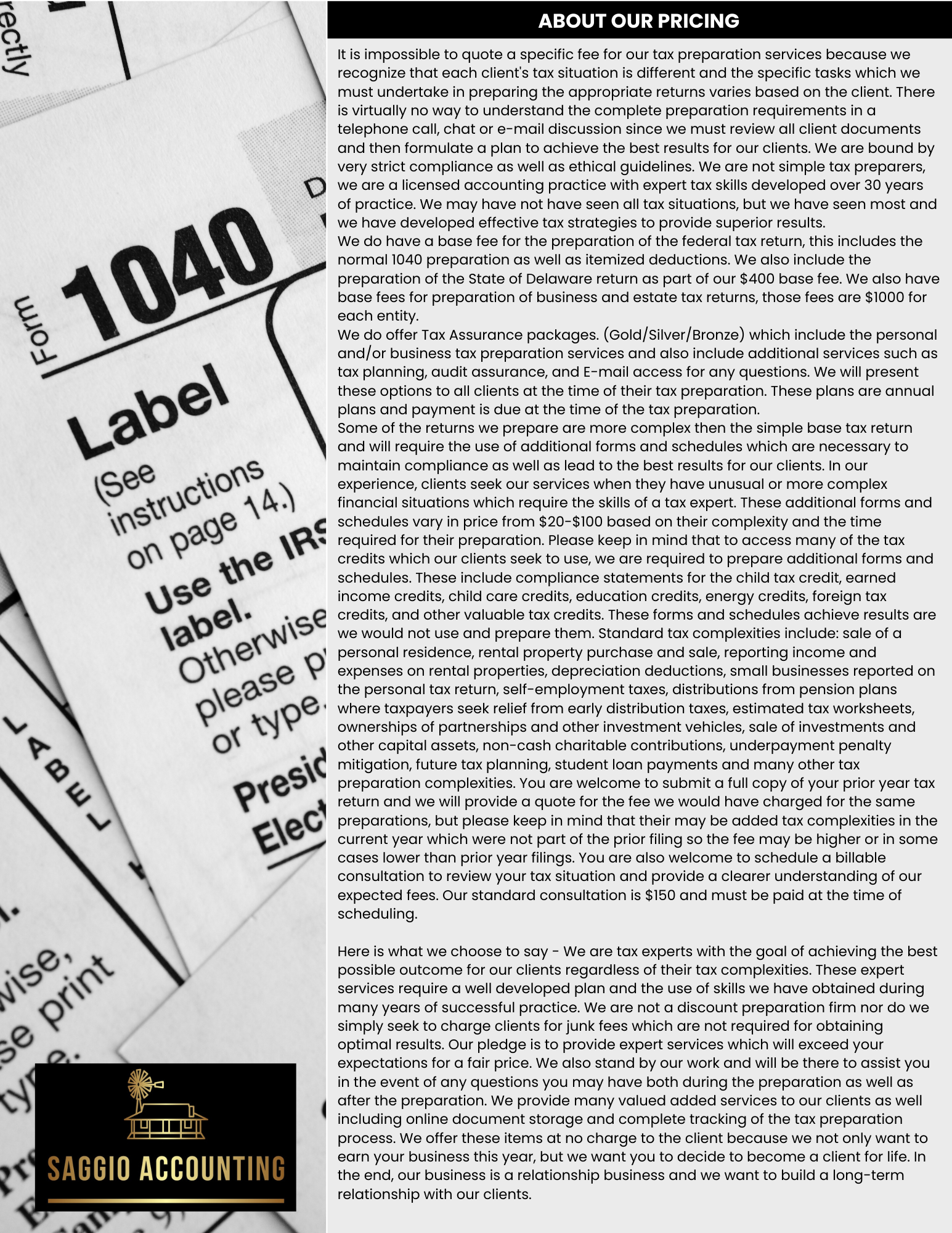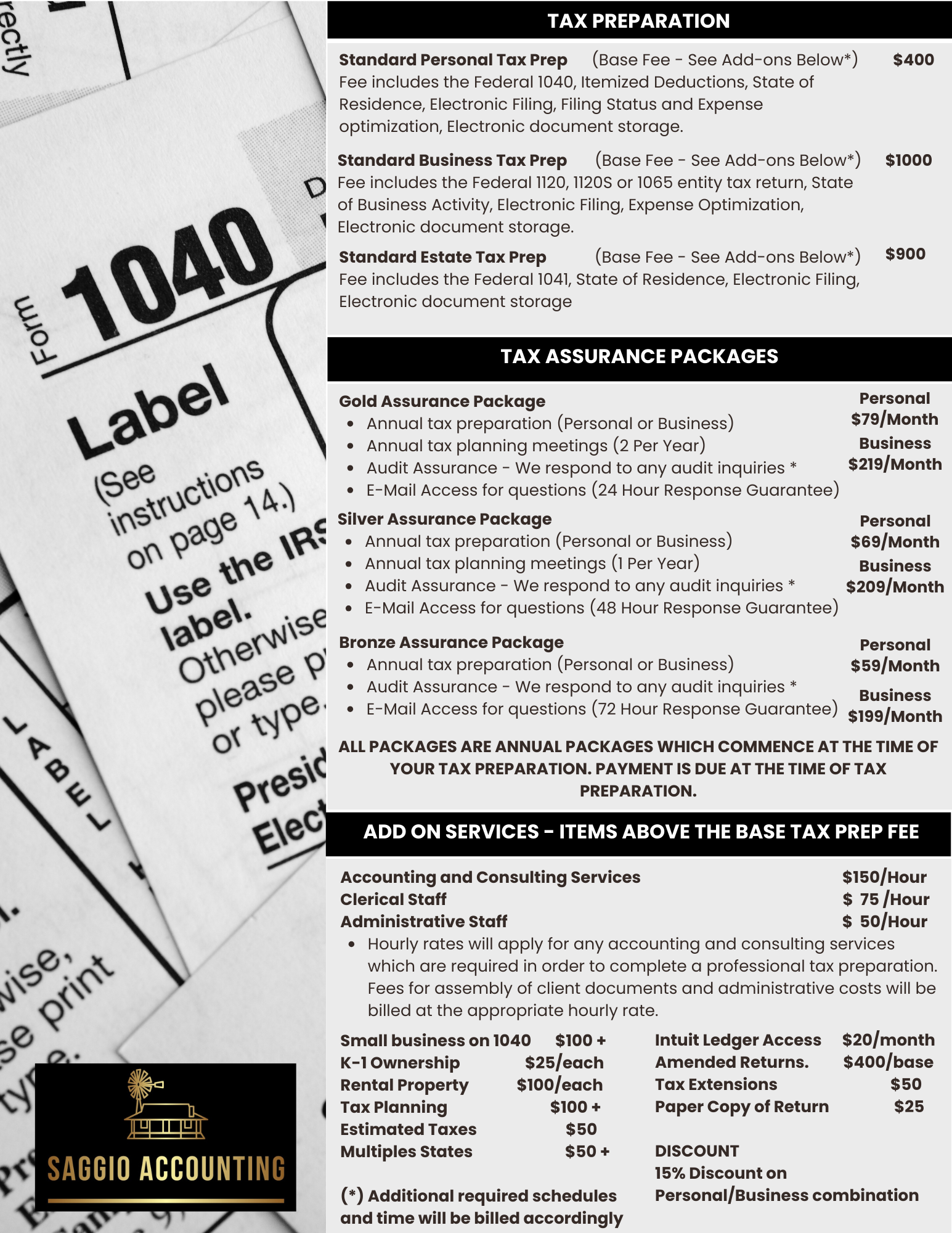Blog
We keep you up to date on the latest tax changes and news in the industry.
Pass-Through Entities Explained

Title: Pass Through Entities Explained - A Comprehensive Guide
Introduction:
In the world of business and finance, understanding the different types of entities and their implications is crucial. One such type is a pass through entity, which includes Limited Liability Companies (LLCs) and S Corporations. With the potential for tax savings and personal liability protection, pass through entities have become a popular choice for many entrepreneurs. In this blog post, we will dive into the fascinating world of pass through entities, exploring how they work, the tax benefits they offer, and the steps to create one for your business.
Understanding Pass Through Entities:
A pass through entity is a business structure where the income generated by the entity "passes through" to the owners' personal tax returns. Unlike traditional corporations, pass through entities do not pay income tax at the entity or business level. Instead, the owners report their share of the business's profit and losses on their individual tax returns. This structure allows owners to potentially pay a lower tax rate on their share of the profits compared to other corporations, resulting in significant tax savings.
Choosing a Pass Through Entity:
Pass through entities, such as LLCs and S Corporations, offer various advantages that make them an attractive choice for many business owners. The potential tax savings, personal liability protection, and flexibility in profit distribution are some of the key benefits. However, it is crucial to carefully consider the specific needs and requirements of your business before choosing a pass through entity structure.
Creating a Pass Through Entity:
If you decide to create a pass through entity for your business, there are essential steps to follow. For example, if you choose to form an LLC, the first step is to select a name that complies with your state's rules and regulations. Then, you will need to file the necessary paperwork with your state's Secretary of State office, which typically involves submitting articles of organization and paying a filing fee. Additionally, creating an operating agreement is crucial to outline the ownership structure, management responsibilities, and other important details of your business. It is highly recommended to consult with a qualified attorney or business advisor at this stage to ensure compliance with legal requirements.
Liability Protection:
One significant advantage of pass through entities is the personal liability protection they offer to owners. In the case of an LLC, the owners, known as members, are generally not personally liable for the debts and obligations of the business. This means that personal assets, such as homes and cars, are usually protected from business-related lawsuits or financial issues. However, certain circumstances, like personal guarantees on loans or engagement in fraudulent activities, can still hold owners personally liable. Consulting with a legal professional is critical to understanding the specific laws and regulations in your jurisdiction.
Tax Benefits of Pass Through Entities:
Pass through entities offer several tax benefits that can lead to significant savings. Unlike traditional corporations, pass through entities avoid double taxation. This means that the income is only taxed at the individual level when reported on the owners' personal tax returns. Additionally, certain pass through entities, like S Corporations, allow owners to pay themselves a reasonable salary and receive the remaining profits as distributions. This strategy can potentially reduce self-employment tax and result in substantial tax savings. It is essential to consult with a professional to ensure proper setup and compliance with tax regulations.
Retained Earnings and Tax Implications:
Pass through entities provide options for retaining earnings within the business for various purposes, such as reinvestment, expansion, or debt repayment. Unlike corporations, there are typically no specific restrictions or accumulated earnings taxes that apply to retained earnings in pass through entities. However, owners may still be required to pay taxes on their share of the profits, even if no actual cash distribution occurred. This "phantom income" or "constructive dividends" is reportable on the owners' individual tax returns. Consultation with a tax professional is vital to navigate the complexities of pass through entity taxation and ensure compliance with tax laws.
Conclusion:
Pass through entities, such as LLCs and S Corporations, provide business owners with opportunities for tax savings and personal liability protection. By understanding the intricacies of these entities and leveraging their benefits, you can lower your tax burden, protect yourself from liabilities, and set your business up for financial success. It is essential to consult with legal and tax professionals who can provide personalized guidance based on your specific circumstances. Remember, mastering your finances, lowering your taxes, and finding personal success is a journey. Stay financially savvy and explore the possibilities of pass through entities for your business.
Thank you for joining us on this comprehensive guide to pass through entities. If you have any questions or topics you'd like us to cover in future episodes, feel free to leave us a voicemail on the Ask Ralph podcast website or share your thoughts in the comments below. Your feedback is invaluable to us. Stay tuned for more valuable insights and strategies to help you on your path to financial freedom.
Please share our Podcast with all your friends and family!
Submit your questions or ideas for future shows - email us at ralph@askralph.com or leave a voicemail message on our podcast page Leave A Voicemail Message
Like us on Facebook and follow us on Facebook at https://www.facebook.com/askralphmedia Twitter (@askralphmedia) or visit www.askralphpodcast.com for more information.
To schedule a consultation with Ralph's team, contact him at 302-659-6560 or go to www.askralph.com for more information!
Buy Ralph's Book - Mastering Your Finances! on Amazon
Sign up for our newsletter.
Each month, we will send you a roundup of our latest blog content covering the tax and accounting tips & insights you need to know.
We care about the protection of your data.
TAX ASSURANCE PRICING
Personal Income Tax Services
In addition to our normal tax preparation service, we also offer the Tax Assurance Packages for those clients who want more than just a tax preparation. These packages are annual packages which provide superior tax preparation, tax planning and access to a tax expert via e-mail. All of these additional services are free of charge to those clients who select on of our Tax Assurance Packages.
Bronze Assurance Package
-
Annual Tax Preparation
-
Audit Assistance - We respond to audit inquiries
-
E-Mail Access for questions (72 Hour Response)
Gold Assurance Package
-
Annual Tax Preparation
-
2 Tax Planning Meetings per year
-
Audit Assistance - We respond to audit inquiries
-
E-Mail Access for questions (24 Hour Response)
Silver Assurance Package
-
Annual Tax Preparation
-
Annual Tax Planning Meeting
-
Audit Assistance - We respond to audit inquiries and E-Mail Access for questions (36 Hour Response)
TAX ASSURANCE PRICING
Business Income Tax Services
In addition to our normal tax preparation service, we also offer the Tax Assurance Packages for those clients who want more than just a tax preparation. These packages are annual packages which provide superior tax preparation, tax planning and access to a tax expert via e-mail. All of these additional services are free of charge to those clients who select on of our Tax Assurance Packages. These packages include both the business and personal tax related preparation services.
Bronze Assurance Package
-
Annual Tax Preparation (Business and Personal)
-
Audit Assistance - We respond to audit inquiries
-
E-Mail Access for questions (72 Hour Response)
Gold Assurance Package
-
Annual Tax Preparation (Business and Personal)
-
2 Tax Planning Meetings per year
-
Audit Assistance - We respond to audit inquiries
-
E-Mail Access for questions (24 Hour Response)
Silver Assurance Package
-
Annual Tax Preparation (Business and Personal)
-
Annual Tax Planning Meeting
-
Audit Assistance - We respond to audit inquiries and E-Mail access for questions (48 Hour Response)

